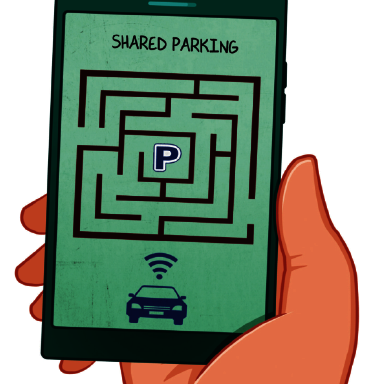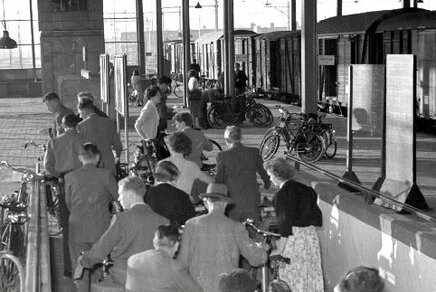Individual and household decision-making in shared parking
Qianqian Yan defended her PhD thesis at the department of Built Environment on January 31st.

Private parking spaces account for a large proportion of parking resources, but as they are privately owned and used by owners, their utilization rate is low. Shared parking means sharing private parking spaces to the public during idle times. It can alleviate parking difficulties, but can also provide economic benefits to parking space owners. Shared parking initiatives have been piloted in a number of urban areas; however, the development of these systems remains in its infancy. Therefore, it is important for urban planning and parking management to understand people’s decision-making mechanisms underlying the acceptance of the shared parking concept. For her PhD research, Qianqian Yan took a closer look at individual and households’ willingness to share private parking space.
First, Qianqian Yan devised a model based on prospect theory to identify the key variables that influence owners’ willingness to share a private parking space under uncertainty. The influence of socio-demographic variables, context variables, and alternative-specific variables is explained. The parameters of prospect theory are estimated to exhibit the sensitivity diminishing psychophysics of value function and inverse S-shape form of probability weighting function. A random parameter version of the model is specified to examine preference heterogeneity.

Regret theory
Regret theory is another theory to decision-making under uncertainty. It assumes that people anticipate regret if they make the wrong choice, and they consider this anticipation when making decisions.
Yan and her collaborators presented decision-making under uncertainty based on regret theory. A hybrid expected utility-regret model is specified to explore private parking space owners' propensity to participate in shared parking. Besides, another emotion—rejoice—is added to the hybrid function.
Finally, equivalent models considering the perception of attribute differences were estimated. By comparing the random expected utility based model, random regret model, and hybrid expected utility-regret models, Yan found that the latter outperformed the pure models, although the differences were small. By incorporating rejoice, the performance of the models improved. The best results were obtained when in addition a perceptual mapping function was introduced, which significantly enhanced the explanatory power of the model.
Latent variables
To explore how unobservable latent variables play a role in the decision-making process of shared parking participation, Yan incorporated latent variables including respondents’ personality traits and attitudes towards shared parking into a choice model, with three variants specified and tested.
The first variant of the HCM added linear effects of selected personality traits and attitudinal latent variables. The second variant added interactions between relevant personality traits and attitudes. Finally, the third variant specified non-linear effects of the personality traits and attitudes. Results indicate that personality traits and attitudes play a significant role in explaining owners’ decision-making about sharing their parking space. Non-linear effects and interactions significantly improve the overall explanatory power of the model.

Household decision-making
Sharing private parking space not only affects one’s own life but have effects at the household. Yan also presented a household decision-making model which is developed to understand how household dynamics lead to the household decision to join a shared parking scheme.
Leadership personality is introduced as a main driver of household member decision weights, together with individual and household characteristics. Equity seeking/avoiding behavior was also captured by the model. It is found that couples play a pivotal role in the bargaining and negotiation process. The assumption that the spouse with a stronger leadership personality has a higher decision weight is verified. Husbands play on average a more important role, which may stem from traditional family ideology or because husbands are the main car users.
In households where wives are in charge of financial management, husbands have a lower decision weight, whereas in households where husbands are in charge of financial management, they have a higher decision weight. Other interesting findings are that men with higher levels of education have a stronger sense of gender equality and that households favor alternatives that provide a more equal utility distribution across the couple.
Title of PhD thesis: Individual and household decision-making in shared parking. Supervisors: Harry Timmermans and Tao Feng.
Media contact
Latest news


![[Translate to English:] [Translate to English:]](https://assets.w3.tue.nl/w/fileadmin/_processed_/e/0/csm_BvOF%202019_1031_BHF%20license%20TUe%20ILI%20copy_8a50884392.jpg)